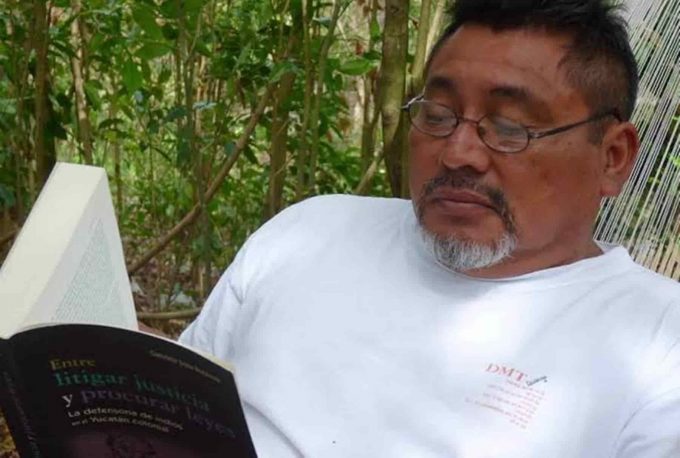
By Luis Hernandez Navarro
Pedro Uc Be is by far one of the most important indigenous intellectuals in Mexico. Maya born in the community of Buctzotz, Yucatan, 90 kilometers northeast of Merida, he is, simultaneously, a poet, educator, theologian, translator of the Bible and popular organizer. He has won three awards for poetry and one for narrative.
Last December 16, he and his son were threatened with death. “We’re fed up with you now, get out of here in 48 hours or we kill you and your old lady together with those pigs, your honorary children,” they told them in WhatsApp messages. “Now you’re going to stop sucking or your people will die, you are affecting a lot of local people with your blowjobs and your defense of territory.”
Pedro was born in 1963 in the bosom of a campesino family, monolingual in Maya. His grandparents were slaves on a cattle-ranching estate in Buctzotz. He learned Spanish in his community’s public primary school. He continued his instruction in a Presbyterian seminary in Merida, where he trained in theology. Upon finishing, he traveled to San José, Costa Rica, where he took more theology courses and a bachelor’s degree in education in the area of social sciences. He continued studying literary creation in Mayan language at the State Center for Fine Arts in Merida.
In Costa Rica “the scales fell from his eyes,” upon entering into contact with a different church than the one he knew, and with liberation theology. Later on, upon collaborating with Samuel Ruiz and the Diocese of San Cristóbal, he approached Indian theology and became its promoter on the Yucatan Peninsula. In this way, he rediscovered his history, his language and his values. That caused them to run him out of the church.
Starting in 1985, he visited communities on the Yucatan Peninsula; first, to teach workshops on Indian theology and on Liberation theology. Following his expulsion from the church, he gave workshops on human rights with a focus on indigenous law, on identity and territory. Since then, more than 35 years have passed in which Pedro has toured the majority of the region’s communities. He knows them firsthand, from top to bottom.
Maestro Uc Be was initiated into poetry and narrative in Mayan out of necessity and and out of powerlessness. Reading books about philosophy and economics led him to discover the reasons for marginalization, poverty and the flattening that the poor suffer. The discovery caused him a pain that obliged him to name things with the written word in Mayan, narrating what he experienced from work with the communities.
Pedro speaks Mayan. He always has, just like his family. At the end of the seminar he joined a team of specialists that was working on the translation of the Old Testament into Mayan. He participated in the project for two years. The experience allowed him to understand very important things inside the language. He began to translate other texts and write his own. From there, he discovered the philosophical thought that exists in the Mayan language and realized the enormous wealth that it has.
In 1992, the so-called celebration of the 500 years since the discovery shook him. He responded by turning to the communities to denounce the event. He participated actively in the big national march on October 12 of that year in Mexico City. The experience marked him. Two years later, the Zapatista insurrection impacted him again. His closeness with Samuel Ruiz allowed him to be informed about the uprising and to comprehend its nature. At the beginning of 1996 he became involved in the National Indigenous Congress (CNI, its initials in Spanish). He then turned to building autonomy and self-determination in the region, and to building a peninsular organization capable of becoming the backbone of the resistance and reconstitution of the peoples as peoples.
Since 13 years ago, with the arrival of the Mennonites to the region and the cutting down of thousands of acres miles of jungle and planting of transgenic soybeans, Pedro has been committed to the defense of land and territory. The “modernizing” offensive in the region, sponsored by the governments, walked hand in hand with the devastation and dispossession caused by photovoltaic wind farms, pig farms and “green” tourism.
To confront the entrepreneurial invasion, in 2918 Pedro and his compañeros founded the Assembly of Defenders of Maya Territory Múuch Xíinbal. The organization, born of decades of community work, has deep roots, possesses an indisputable regional authority and representativeness, and has harvested important victories against different megaprojects.
The construction of the Maya Train is, according to the poet, a continuation of the assault against the indigenous lands and territories of previous projects. For him, it is an imposition not consulted with the communities. It’s a big grab, in the sense that it dispossesses the peoples of many thousands of acres of land and also of their language and ways of life. The death threat against Uc and his son is a direct result of his active opposition to this colonizing project (https://bit.ly/37RdNRZ).
In talking about his struggle against the Maya Train, Pedro Uc says: “Yes, as Monsiváis says, we are about lost causes. We are accustomed to losing. But it’s not about winning; it’s about struggling. We don’t want to collaborate in our own murder. We want to struggle to avoid it. That is what is in our hearts.”
———————————————————–
Originally Published in Spanish by La Jornada on Tuesday, June 23, 2020 https://www.jornada.com.mx/2020/06/23/opinion/018a1pol It has been re-published with English interpretation by the Chiapas Support Committee and re-posted by Schools for Chiapas with permission by Chiapas Support Committee.
